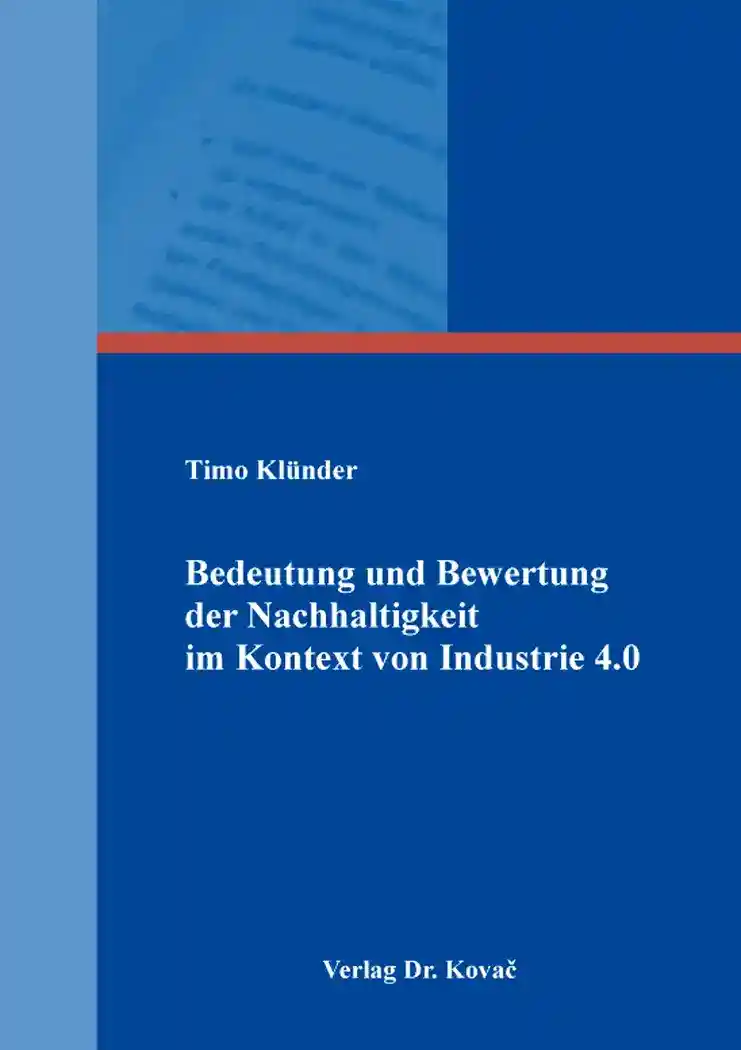Timo KlünderBedeutung und Bewertung der Nachhaltigkeit im Kontext von Industrie 4.0
Nachhaltigkeits-Management – Studien zur nachhaltigen Unternehmensführung, volume 47
Hamburg 2022, 396 pages
ISBN 978-3-339-12416-6 (print) |ISBN 978-3-339-12417-3 (eBook)
About this book deutschenglish
Economic challenges such as the United Kingdom’s exit from the European Union or demographic change demand an increase in the economic performance of companies. Global climate change also poses a challenge for production. Increasing ecological performance is necessary to stabilize the temperature rise and meet the 1.5 °C target. Socio-fair production is a relevant consumption criterion for more than one-third of all consumers. Increasing social performance is therefore also essential for many companies. Addressing these economic, environmental and social challenges is a complementary management task, the shared goal of each being sustainable development. Such fundamental changes in production can be triggered by the so-called fourth industrial revolution, also referred to as Industry 4.0 due to its digital character in reference to the version identifiers of software. The transition to Industry 4.0 requires companies to create value cooperatively as well as sustainably. The choice of a value creation partner consequently has to be based on the underlying conditions of Industrie 4.0 and sustainable production.
This leads to a complex bundle of objectives that is unmanageable for decision-makers from the field. In order to nevertheless be able to make beneficial cooperation decisions, a holistic, application-oriented and empirically supported instrument is developed for the ad-hoc selection of the most suitable cooperation partner for maintaining or establishing sustainable production in Industrie 4.0. After drawing an analogy between the production concept Lean Production and the production paradigm Industrie 4.0, the methodological, structural and content-related principles of Lean Production are adapted. This analogous transfer provides the groundwork for the development of an application-oriented and an analysis-oriented benchmarking tool for the selection of a suitable cooperation partner. While the application-oriented Industrie 4.0 sustainability cube represents a transparent, user-friendly and flexible way to select a cooperation partner, the analysis-oriented Industrie 4.0 sustainability benchmarking contributes to a deeper understanding of the decision-making situation. This procedure is enabled by interviewing twelve experts, applying the Analytic Hierarchy Process and the outranking procedure PROMETHEE. The integration of these procedures makes it possible to make cooperation decisions in a more structured and sustainable way than with purely intuitive decision making. The application of the two tools is illustrated by a case study from the area of engineering.
Keywords
AnalogiebildungAnalytischer HierarchieprozessBenchmarkingExpertenbefragungKooperationLean ProductionLogistikNachhaltige EntwicklungNachhaltigkeitOrganisationPROMETHEESupply ChainUnternehmensführungIhr Werk im Verlag Dr. Kovač

Möchten Sie Ihre wissenschaftliche Arbeit publizieren? Erfahren Sie mehr über unsere günstigen Konditionen und unseren Service für Autorinnen und Autoren.
